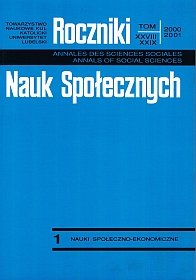Freedom of science and culture
Abstract
The author analyses the problem of freedom of science and art that are integral elements of intellectual culture. Although the Church has always been an inspirer and patron of culture, there have been controversies between this institution and scientists (the cases of Galileo and Copernicus, the Darwinian theory of evolution). Liberalism rightly propagates the idea of freedom of culture but it minimises the role of truth that is the leading value in culture. Totalitarian systems (Hitlerism, Communism) questioned the value of culture and practically destroyed it. Documents of the Vatican Council II and Pope John Paul II's teaching allow formulation of three fundamental paradigms of personalism: 1. Science and culture require freedom in social life (which is confirmed by the pluralism of branches of science and culture currents). 2. Development of authentic culture requires moral righteousness and responsibility from the scientist and one who creates culture. 3. The good of a human person (of his biological and spiritual life) and the society's common good (protection of its integrity and ethos) sometimes require limitation of research freedom that should be regulated by the law (e.g. in genetic engineering).
References
Berhard W. I., Sztuka hellenistyczna, Warszawa 1980.
Berlin I., Dwie koncepcje wolności i inne eseje, Warszawa 1991.
Dawson Ch., Religia i powstanie kultury zachodniej, Warszawa 1958.
Dec I., Wolność w nauce, w: Wolność we współczesnej kulturze. Materiały V Światowego Kongresu Filozofii Chrześcijańskiej, KUL − Lublin, 20-25 sierpnia 1996, red. Z. J. Zdybicka, J. Herbut i in., Lublin 1997, s.563-573.
Donat K., Wolność nauki, tłum. W. Rosłan, Kraków 1930.
Hobbes Th., System przyrody, tłum. K. Szaniawski, t. I, Warszawa 1957.
JanPaweł II, Wiara i kultura, Rzym 1986.
Janssens L., Personne et société. Théories actuelles et essai doctrinal, Louvain 1939.
Kowalczyk S., Filozofia kultury. Próba personalistycznego ujęcia problematyki, Lublin 1996.
Kowalczyk S., Podstawy światopoglądu chrześcijańskiego, Wrocław 1996.
Kowalczyk S., Liberalizm i jego filozofia, Katowice 1995.
Kowalczyk S., Filozofia wolności. Rys historyczny, Lublin 1999.
Leeuwen A. F. van, Liberté et moralité, w: Enquête sur liberté, Paris 1953.
Lekka-Kowalik A., O wolności i granicach badań naukowych, w: Wolność we współczesnej kulturze, s. 575-590.
Leon XIII, Libertas, Freiburg im. Br. 1888.
Maritain J., Religia i kultura, Poznań 1937.
Marks K., Engels F., Dzieła wybrane, t. I, Warszawa 1949.
Meuers J., Freiheit und Wissenschaft, w: Die Freiheit des Westens. Wesen, Wirklichkeit, Widerstände, Hrsg. O. B. Roegele, Graz−Wien−Köln 1967, s. 205-231.
Morawski S., Na zakręcie: od sztuki do po-sztuki, Kraków 1985.
Mounier E., Wiara chrześcijańska a cywilizacja, w: tenże, Co to jest personalizm? Kraków 1960, s. 119-157.
Platon, Państwo, tłum. W. Witwicki, Warszawa 1958.
Prawa człowieka. Wybór źródeł, oprac. K. Motyka, Lublin 1996.
Tatarkiewicz W., Sztuka a prawda, w: tenże, Dzieje sześciu pojęć, Warszawa 1975.
The Galileo Affair. A Meeting of Faith and Science, Città del Vaticano 1985.
Toynbee A. J., Christianity among the Religions of the World, New York 1957.
Zaragueta J., A propos de la liberté, w: Enquête sur liberté, s.323-330.
Copyright (c) 2001 Roczniki Nauk Społecznych

This work is licensed under a Creative Commons Attribution-NonCommercial-NoDerivatives 4.0 International License.


